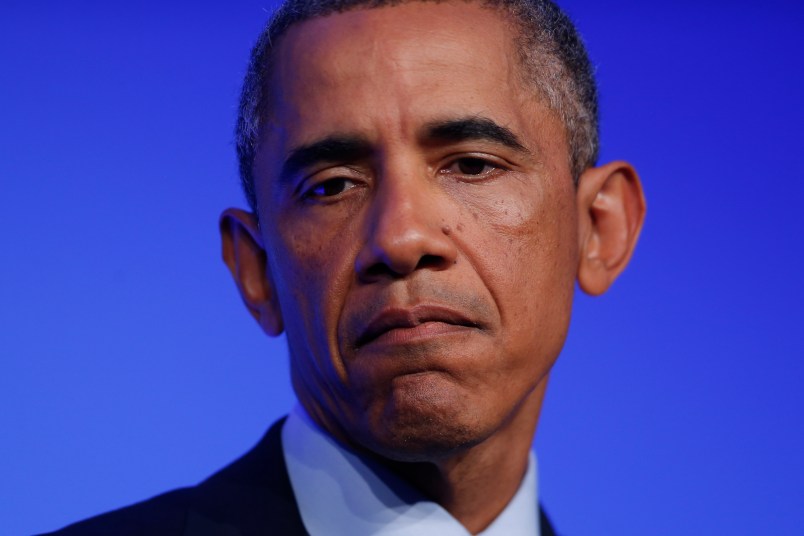Within political circles, the big question for the 2014 midterm election is: Who’s going to control the Senate for the rest of Obama’s presidency? Will Republicans get to be a fully formed thorn in the president’s side? Or will the deadlocked status quo that’s been so maligned over the last four years simply continue?
But are the people who will actually decide the outcome — voters — seeing the same storyline?
The Washington Post’s Greg Sargent took a enlightening look at this question last week. In particular, he examined with the help of a Democratic pollster one of the key constituencies for the November elections: Democratic voters who don’t usually turn out in midterm elections. It is widely believed that those voters need to show up for Democrats to give their party its best chance of keeping the upper chamber.
But, according to Sargent and some focus grouping and polling by Democratic pollster Celinda Lake, at least some of those voters don’t see the election in those terms.
Lake’s research firm held two focus groups in Michigan for MoveOn.org, with single white women under 55 and married white women under 35 making up one group and African-American women making up the other.
“We were exploring what would motivate them to turn out to vote,” Lake told Sargent. “One of the things that came up is that these drop-off voters had no idea that control of the Senate was even up for grabs and were even very confused about who controlled it. These voters are very representative of drop-off voters in a lot of states.”
That reality rang true for other Democratic pollsters and operatives who have been evaluating the 2014 electorate.
“I don’t think process is a motivator. Half (of voters) think Republicans control both the House and Senate,” Stan Greenberg, another Democratic pollster, told TPM. “Views of House Republicans are a better predictor of Senate votes than views of any of the Senate leaders and parties.”
Or as another Democratic operative involved in 2014 strategizing said succinctly of Lake’s findings: “No surprise.”
The glimmer of hope for Democrats in Lake’s research is that the focus groups were motivated once they found out that their Senate race could determine who controls the Senate, especially after that was tied to specific issues. Lake also surveyed 1,000 “low propensity” Democratic voters in key Senate states: North Carolina, Colorado, Iowa, Michigan and Kentucky.
She tested which specific issues motivated Democrats once they knew that the Senate was at stake. The polling found: 58 percent said Republicans limiting access to abortion and birth control was “very concerning”; 58 percent said the same of reversing key elements of the Affordable Care Act; and 57 percent were very concerned about the GOP undoing workplace protections for women.
If Democrats have any hope of harnessing the Senate-control narrative as a get-out-the-vote tool, that’s how they’ll do it, according to the Democratic operative.
“Party control is insufficient unless there are salient consequences that are credible,” the operative said.
But even so, others like Greenberg are skeptical. While Democratic candidates are certainly attacking their opponents or boasting their own bonafides on those issues, the message is rarely placed in the context of Senate control. So while that might be conversation in Washington, D.C., it’s not the one that voters are hearing.
“I can’t see it breaking through,” Greenberg said.







Would it be that bad? How would it be any different than it is now? Congress passes nothing now, and it would pass nothing later.
The only important thing is getting a Supreme Court nominee through, and I don’t expect there to be one.
We say that those right wingers who watch Fox are the most uninformed people in this country, and yet as a Dem, I read this and am appalled at how incredibly stupid so many Dems are. If you do not even know who is in control of the Senate right now, then you are a complete idiot. We can not blame right wing BS propaganda and right wing voters for the mess this country is in, when we have so many in our own party who are this incredibly brain dead.
I am sure that most of these people they talked to are those that constantly complain about what a mess this country is, and how their concerns are never addressed. Talk about willful ignorance, which there is no excuse for in this information age.
Become a leader for these people. Contact a Democratic campaign and see how you can help contact folks. It takes a door-to-door effort.
This article is full of feces! Note what it says “some of those voters don’t see the election in those terms.”
It says “some,” that’s a very small amount of those who vote. Democratic voters can be just as uninformed as GOP voters. You have to be willing to educate yourself on the issues. Not everybody is a political junkie. However, I still think Democratic voters are better informed than Republican voters.
I find this article appalling. As we get closer to November, I see more articles downplaying Democratic turnout. That there should tell you something, as nobody is downplaying GOP turnout.
I have been canvassing, GOTV, and from what I hear, Dems are voting. Just so you know, KY is a red state because Dems don’t vote. They’re voting this year.
I sure hope so, but Alison is not doing well in the polls lately. In fact her campaign seems have lost some direction.